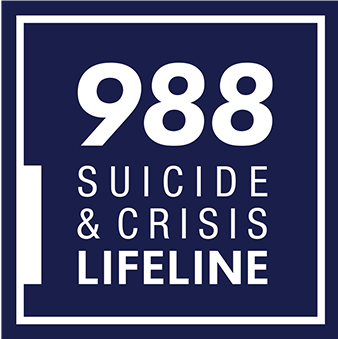|
Crisis Support
|
You can call crisis 24/7 to speak with a trained crisis professional. We also provide mobile response services and can come to the person in crisis anywhere in Wayne or Holmes Counties.
Crisis Team Direct Phone: 330-845-HELP (4357).
Walk-in crisis support is also available at our main office during business hours:
The Counseling Center - Main Wooster Office
2285 Benden Drive
Wooster, OH 44691
8 am to 5 pm, Monday through Friday
If you are having a suspected medical emergency (example: heart attack, stroke), please call 9-1-1 and go to your nearest local hospital emergency room.
We're Here For You 24/7
Because crises can occur anytime, crisis intervention services are immediately available 24 hours a day, seven days a week. They provide an opportunity for you and other important people in your life to find solutions to problems by talking about them with a trained mental health professional.
We respond to crisis for people of all ages, including children, youth, and adults.
What Is Crisis Intervention and What Can It Accomplish?
You're Not Alone — We're Here When You Need Help Most
Life’s stressors can build gradually or strike all at once. When that pressure becomes overwhelming, it can lead to intense emotional distress, leaving you feeling unsafe, unable to function, or unsure how to cope.
In moments like these, you shouldn't have to wait.
That’s why Crisis Intervention Services are available to support you—any time, day or night.
What Is Crisis Intervention?
Crisis Intervention is a short-term, intensive service designed to help you manage and move through a serious emotional or mental health crisis. Whether you're experiencing anxiety, depression, trauma, or another overwhelming situation, we’re here to help.
Our 24/7 Crisis Services Offer:
- Immediate support, available 24 hours a day, 7 days a week
- A chance to talk with a trained mental health professional
- Help involving supportive people in your life, if desired
- Guidance to understand what you're going through
- Tools and strategies to help you cope
- Connection to additional mental health resources, if needed
You don’t have to face this alone. Reaching out is a strong and courageous first step—and we're here for you, whenever you need us.
How Much Time Does Crisis Mental Health Services Take?
How Crisis Services Work
Crisis intervention is meant to provide immediate, short-term support during difficult or overwhelming moments. The goal is to help you feel safer, more stable, and better able to cope—right when you need it most.
What to Expect from Crisis Services:
- Brief and focused support — Sometimes, just one phone call or in-person session is enough to help stabilize the situation. Other times, a few follow-up contacts may be needed.
- Mobile response — If needed, a crisis therapist can come to you. In most cases, someone can be there within an hour or two to provide in-person support, wherever you are.
- Next steps, if needed — If your situation is more complex and ongoing support would be helpful, your crisis therapist may recommend more traditional mental health care. They’ll guide you through the process and help set up the right services for you.
- Continued support — Your crisis therapist will stay in touch with your new care team to make sure you're getting the help and support that feels right for you.
We’re here to meet you where you are—literally and emotionally—with care that’s compassionate, responsive, and respectful of your unique situation.
How Can I Make Crisis Mental Health Services Successful for Me?
Getting the Most Out of Crisis Services
Crisis services are here to support you through difficult moments, but your openness and willingness to engage play an important role in how helpful they can be.
Tips to Help You Through a Crisis:
- Be honest and open. Share your thoughts, feelings, and experiences as honestly as you can—especially if you're having thoughts of harming yourself or others, or if you're using alcohol, drugs, or medications. Your therapist is here to help, not to judge.
- Take care with substances. Try not to use alcohol or drugs during a crisis. If you're on prescribed medications, be sure to take them exactly as directed.
- Avoid big decisions right now. Crisis moments aren’t the best time to make major life choices. Once things feel more stable, your therapist can help you explore your options with a clearer mind and more support.
- Be open to new perspectives. It’s okay if something feels unfamiliar at first. Try to stay open to new ways of understanding your situation and new coping strategies—even if you’ve never tried them before.
- Hold on to hope. A crisis can sometimes be the beginning of important, positive change. Healing takes time, but things can get better.
- Know when more help is needed. If your challenges are ongoing or complex, crisis services may not be enough on their own. Your therapist can help connect you with longer-term support that’s better suited to your needs.
- Remember your strength. Your therapist is here to walk beside you—but you are the one in charge of your healing journey. You have the power to make choices that lead to a healthier, more hopeful future.

|
Mobile ResponsE & Stabilization Services (MRSS)
|
Do you know a youth experiencing a mental health crisis? MRSS provides trained youth mental health professionals that can help over the phone and come to wherever the youth is located to help them! Any youth residing in Wayne or Holmes Counties is elibile for this support.
MRSS is delivered to any young person under the age of 21, who is experiencing escalating emotional symptoms, behaviors, or traumatic circumstances that have impacted their ability to function within their family, living situation, school, or community. MRSS is available to all youth and families (birth, kinship, foster, guardianship, and adoptive) in Ohio. Families need not be involved with a specific service or system to access MRSS.
Services provided by The Counseling Center's MRSS team may include:
safety assessments, de-escalation, peer support, and skill building, among others.
You make the call, together we respond.
Experiencing a Crisis, Call 988
For general MRSS information or questions call 330.500.MRSS (6777)Available 8am to 8pm Monday-Friday
MRSS is more than a mental health service as it can intercede proactively with any young person experiencing distress due to acute trauma, placement disruption, conflict within the family, or other events in the school or community.
Immediate Response
MRSS is designed to promptly address situations in which young people are experiencing emotional symptoms, behaviors, or traumatic circumstances that compromise or impact their ability to function within their family, living situation, school, or community.
Stabilization
MRSS is a community based, in-person, intervention and support service for youth and families, provided by a mobile response and stabilization service team. It is a prevention-focused emergency program that serves as a gateway to other services across the system of care.
Intervention
The MRSS service delivery model is designed to prevent: 1) the unnecessary use of emergency departments or acute care services; 2) placement disruptions; and/or 3) involvement in the juvenile justice system.
Linkage
MRSS involvement to de-escalate the crisis, stabilize the young person and family, restore safety, build skills to avert future crises, provide referral, and linkages to appropriate services, and coordination with other systems.
|
Crisis Resources
|

Mental Health Crisis Response
The Counseling Center's emergency response team provides crisis intervention, pre-hospital screening, and community consultation 24 hours a day, seven days a week.
If you are in crisis please contact us, immediately

988 Lifeline
Our skilled, judgment-free counselors are here to provide compassionate support. You deserve to feel heard and cared about anytime, anywhere, 24/7/365. Whether you're facing mental health struggles, emotional distress, alcohol or drug use concerns, or just need someone to talk to, our caring counselors are here for you. You are not alone.

Mobile Response & Stabilization Service
The Counseling Center's Mobile Response Stabilization Service is available to any young person under the age of 21 and their family (birth, kinship, foster, guardianship, and adoptive) in Ohio. Families need not be involved with a specific service or system to access MRSS.

National Suicide Prevention Lifeline
No matter what problems you are dealing with, we want to help you find a reason to keep living. By calling
1-800-273-TALK (8255) you’ll be connected to a skilled, trained counselor at a crisis center in your area, anytime 24/7.

Maternal Mental Health Hotline
The hotline is accessible by phone or text at 1-833-TLC-MAMA (1-833-852-6262) in English and Spanish. TTY Users can use a preferred relay service or dial 711 and then 1-833-943-5746.
The Maternal Mental Health Hotline is not intended as an emergency response line and individuals in behavioral health crisis should continue to contact the National Suicide Prevention Lifeline at
1-800-273-TALK (8255).

Domestic Violence
...ending violence, creating peace! OneEighty prides itself on providing comprehensive and compassionate services that are tailored to the individual needs of the client and the community.
Domestic Violence, Rape, Sexual Assault Crisis Hotline
Substance Abuse or Addiction Hotline
330-466-0678 (Available 24/7)

Veterans Crisis Line
The Veterans Crisis Line connects Veterans in crisis and their families and friends with qualified, caring Department of Veterans Affairs responders through a confidential toll-free hotline, online chat, or text 24 hours a day, 7 days a week, 365 days a year.
1-800-273-8255 and Press 1
ON-LINE CHAT
Text message to 838255

Poison Control
If you think someone’s been poisoned -- act fast!
Don’t wait to see what happens! Call the National Capital Poison Center RIGHT AWAY!!
1-800-222-1222 24 hours a day, 7 days a week, 365 days a year

Wayne Holmes Information Referral Exchange
WHIRE provides free and confidential information and referral to those in Wayne & Holmes Counties.
Call
330-263-6363 for help with food, housing, employment, health care, counseling and more.

LGBT National Hotline
1-888-843-4564 - Serves callers of all ages offering peer-counseling, information and local resources.
Hours:
Monday through Friday, 2pm - 11pm
Saturday, 9am - 2pm
Email:
help@lgbthotline.org
Coping Tools to Try
- Deep breathing
- Listen to music
- Take a walk
- Exercise
- Play with pet
- Take a shower
- Clean
- Get out of the house
- Talk to or spend time with a friend
- Do something slow and soothing
- Read a book
- Watch TV
- Work a puzzle
- Play a game
- Journal
- Work on a hobby
